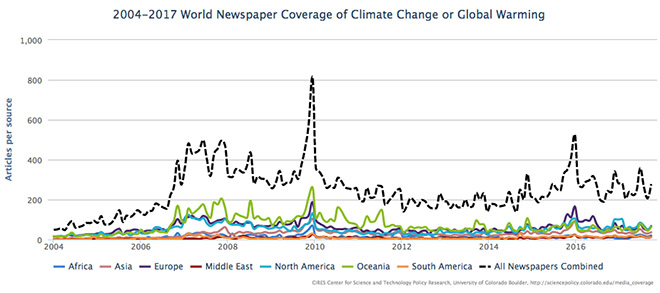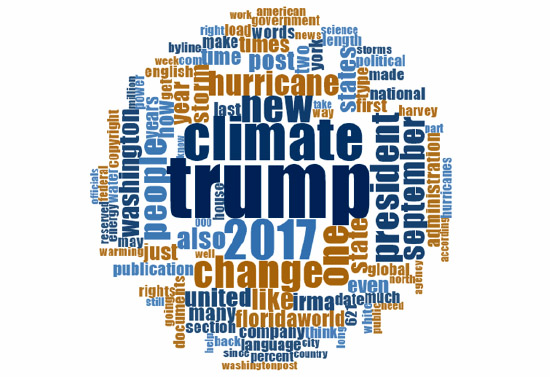Monthly Summaries
Issue 9, September 2017
[DOI]
September media attention to climate change and global warming was up throughout the world. Articles were up 34% globally from coverage in the previous month of August. Scaling down from the global to monitoring in eight nation-states, coverage was also up in each country from the previous month of August 2017: 54% in Australia, 56% in Canada, 10% in Germany, 18% in India, 30% in New Zealand, 82% in Spain, 41% in the United Kingdom, and 16% in the United States (US). While September 2017 counts from fifty-two sources across twenty-eight countries in seven regions around the world were up 14% from coverage in September 2016, coverage in the month was also up about 7% from the average number of stories appearing each month in 2017 (approximately 2300 stories per month from January - September 2017).
Figure 1 shows these ebbs and flows in media coverage - organized into seven geographical regions around the world - from January 2004 through September 2017.

Figure 1. Media coverage of climate change or global warming in fifty-two sources across twenty-eight countries in seven different regions around the world, from January 2004 through September 2017.
In September, coverage relating to ecological and meteorological issues grabbed attention. Hurricanes in the Caribbean Basin - Harvey (in late August), Irma (in early September) and Maria (in mid-September) garnered a range of stories about ecological and human impacts from the storms along with stressors on ecosystem services, flora and fauna. 'Hurricane' was the fourth most frequently invoked word of four letters or more1 in articles across the US press - The Washington Post, The Wall Street Journal, The New York Times, USA Today, and the Los Angeles Times - that also invoked the terms climate change or global warming in September 2017, while 'people' (often relating to impacts from these storms) was the third most frequently used word. For instance, Laura King and Les Neuhaus reported in the Los Angeles Times on September 6th of the then-current human death toll in the Caribbean as hurricane Irma made its way to the Florida Coast. Figure 2 shows three-letters-or-more word use in articles on climate change or global warming, with the size of the term indicating the frequency of their deployment across the month.

Figure 2. Word cloud showing frequency of words invoked in media coverage of climate change or global warming in the United States in September 2017. Data are from five US sources (The Washington Post, The Wall Street Journal, The New York Times, USA Today, and the Los Angeles Times).
Evidence from Figure 2 leads into attention paid to political content of coverage during the month as well. In the US, 'Trump' was invoked 3443 times through the 322 stories this month. 'Trump' was the most invoked term four-letter-or-more making print in climate change or global warming stories in September. 'President' was the second most utilized word in US press accounts. This effectively continued the 'Trump Dump' that was mentioned in previous summaries and that has been detected since January 2017. These political stories were frequently linked to aforementioned ecological/meteorological pieces during this month. Stories also noted the absence of mentions of climate change in US President Trump's address to the United Nations General Assembly in September, but the presence of other world leaders' critiques of the Trump Administration's decision to withdraw from the Paris Agreement. For instance, Ben Glaze from The Mirrorreported on UK Prime Minister Theresa May's September 20th address that contained a "thinly-veiled rebuke to the US President".
These politically-infused media portrayals bridge also to media coverage of scientific dimensions of climate change in September 2017. As an example, Dino Grandoni in The Washington Post recounted on September 14th how US President Donald J. Trump mentioned that these 2017 storms were still not as big as some that occurred in the 1930s and 1940s. This puzzling set of comments generated news coverage in how it appeared to demonstrate that the politicized nature of these issues can influence how one defines 'record setting' and 'big'2, while deflecting how the impacts of the 2017 storms can be exacerbated by coastal development and rising atmospheric and ocean temperatures. This scientifically-germane and politically-drenched stance also showed some signs of fissures among right-of-center political actors. For instance, Arizona Senator John McCain was quoted in media accounts stating a fundamental notion that it is important to recognize that the climate is changing.
Across the globe in September there were a range of stories that pervaded the cultural arena. Articles focused on issues such as local and indigenous-led conservation efforts in the Amazon. Dan Collyns from The Guardian reported September 6th on conflicts between these groups and miners as well as loggers in the region, and also to how these practices affect greenhouse gas emissions inventories from countries like Peru and Brazil. In the corporate cultural sphere, a number of stories at the end of September discussed ExxonMobil’s new voluntary commitments to curb methane emissions leaks from its oil and gas operations. For example, Clifford Krauss from The New York Times reported on a multi-year program to replace equipment and to train new workers in monitoring techniques.
The hurricane season ends November 1, and more is yet to come in news along political, scientific, ecological/meteorological and cultural dimensions of climate change or global warming.
- report prepared by Max Boykoff, Jennifer Katzung and Ami Nacu-Schmidt
1. 'Storm' was the twelfth most invoked term of four letters or more in US press articles also on climate change or global warming.
2. A 1935 storm broke (and still holds) a record for lowest air pressure of any hurricane in the US, but Harvey has more rainfall than any other storm while Irma had the longest sustained category 5 wind speeds in history.
